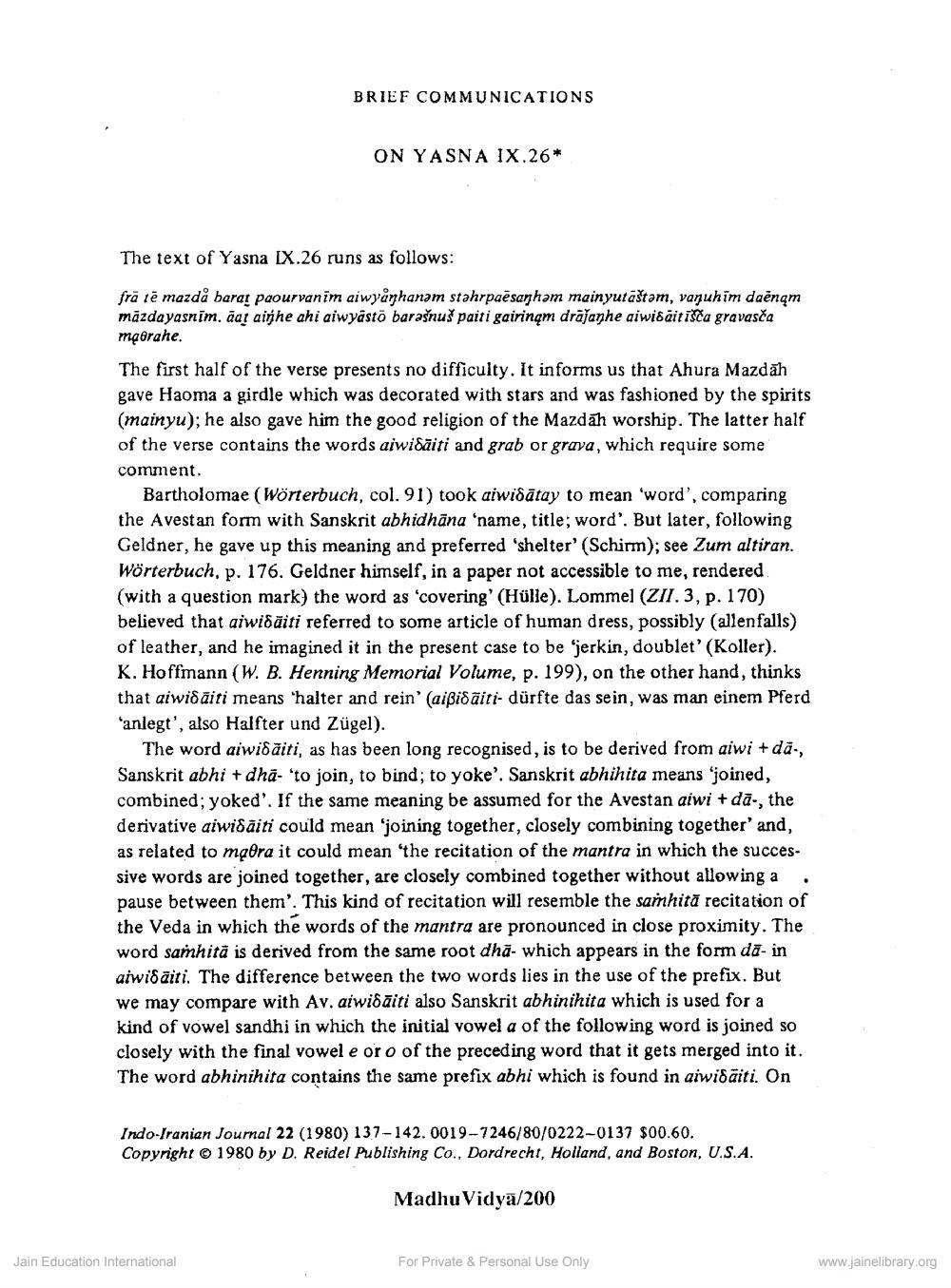________________
BRIEF COMMUNICATIONS
ON YASNA IX.26*
The text of Yasna IX.26 runs as follows:
frā tē mazdå barat paourvanim aiwyånhanam stahrpaēsanham mainyutāstam, vaŋuhim daēnam mazdayasnim. āat ainhe ahi aiwyästö barašnuš paiti gairinam drājanhe aiwisaitišča gravasča mgorahe.
The first half of the verse presents no difficulty. It informs us that Ahura Mazdah gave Haoma a girdle which was decorated with stars and was fashioned by the spirits (mainyu); he also gave him the good religion of the Mazdah worship. The latter half of the verse contains the words aiwidāiti and grab or grava, which require some comment.
Bartholomae (Wörterbuch, col. 91) took aiwidātay to mean 'word', comparing the Avestan form with Sanskrit abhidhāna 'name, title; word'. But later, following Geldner, he gave up this meaning and preferred 'shelter' (Schirm); see Zum altiran. Wörterbuch, p. 176. Geldner himself, in a paper not accessible to me, rendered (with a question mark) the word as 'covering' (Hülle). Lommel (ZII.3, p. 170) believed that aiwidāiti referred to some article of human dress, possibly (allenfalls) of leather, and he imagined it in the present case to be fjerkin, doublet' (Koller). K. Hoffmann (W. B. Henning Memorial Volume, p. 199), on the other hand, thinks that aiwidāiti means 'halter and rein' (aißisäiti- dürfte das sein, was man einem Pferd anlegt', also Halfter und Zügel).
The word aiwidäiti, as has been long recognised, is to be derived from aiwi + dā., Sanskrit abhi +dha- 'to join, to bind; to yoke'. Sanskrit abhihita means 'joined, combined; yoked'. If the same meaning be assumed for the Avestan aiwi + dā-, the derivative aiwidäiti could mean 'joining together, closely combining together' and, as related to mqora it could mean 'the recitation of the mantra in which the successive words are joined together, are closely combined together without allowing a . pause between them'. This kind of recitation will resemble the sarhitā recitation of the Veda in which the words of the mantra are pronounced in close proximity. The word sarhită is derived from the same root dhā- which appears in the form dā- in aiwidžiti. The difference between the two words lies in the use of the prefix. But we may compare with Av. aiwidāiti also Sanskrit abhinihita which is used for a kind of vowel sandhi in which the initial vowel a of the following word is joined so closely with the final vowel e or o of the preceding word that it gets merged into it. The word abhinihita contains the same prefix abhi which is found in aiwidāiti. On
Indo-Iranian Journal 22 (1980) 137-142.0019-7246/80/0222-0137 $00.60. Copyright © 1980 by D. Reidel Publishing Co., Dordrecht, Holland, and Boston, U.S.A.
Madhu Vidyā/200
Jain Education International
For Private & Personal Use Only
www.jainelibrary.org




